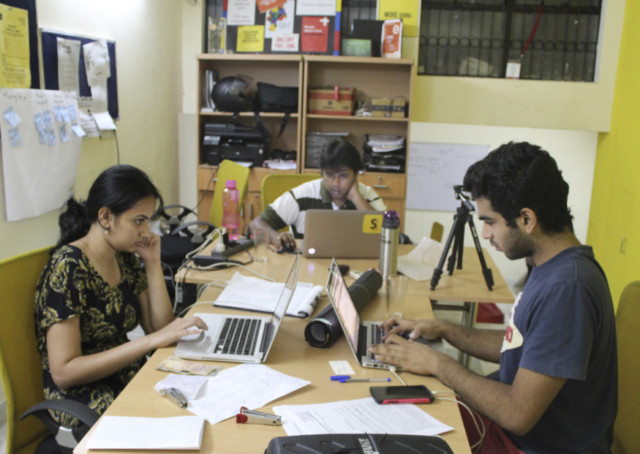
India is witnessing a rising trend of fresh-faced kids, barely out of college, turning job makers rather than job takers. So, what exactly is driving this change?
The Indian Labour Bureau’s report on youth employment and unemployment for 2012-13, states that the rapid increase in the young labour force has not been backed by an equal growth in the job market. The widening of a mismatch in skills is compelling the young to resort to self-employment. A third of graduates and above are unemployed, and even more interestingly, the more educated one is, the less likely will it be to find a job.
Rohit Shroff, Co-founder, Holidify.com, a travel portal focused on niche holiday experiences, says, “The success of the entrepreneurial companies started a few years ago has set things into motion very efficiently. VCs are rapidly setting up shops in India.”
“Currently, the second generation of Indian entrepreneurs are being provided guidance, mentoring and even angel investments by first-generation entrepreneurs.” Shroff founded Holidify.com earlier this year after trying his hand at a couple of other “misfired ventures”, as he calls them, while still at IIT.
Things are improving
Rohit Nair, Co-founder, Quizworks, now India’s leading quizzing company, says, “The environment today is definitely more favourable compared to what it was four years ago when we started. Entrepreneurship is no longer a cuss word and most importantly, families are open to the idea.” He adds, “The ecosystem has definitely improved. The availability of more mentors, funds and technology partners to experiment with new ideas and provide the impetus to start-up has made entrepreneurship conducive.”
A 2011 Gallup study of 20 economic entities in Asia had shown that India ranked in the bottom quartile on several important indicators of a well-functioning entrepreneurial ecosystem. The same study reported, “More than 60 per cent of the Indian population possesses personality traits that are crucial for success as an entrepreneur — such as business thinking (69 per cent), optimism (66 per cent), and persistence (65 per cent) — which suggests a wealth of entrepreneurial capacity.” However, when asked about the difficulty of starting a business, 46 per cent Indians said that the government makes it hard to start a business. The report further observed that “conditions that must improve include the government — such as its honesty and efficiency, simplifying tax laws, reforming investment regulations, reducing the number of procedures required to start a business, and reducing the time and cost of enforcing legal contracts — and society — such as increasing the interactions and collaboration among investors, aspiring or existing entrepreneurs, and advisers or educators.”
The EY G20 Entrepreneurship Barometer 2013, which is designed to help leading countries benchmark their progress and performance on this vital issue, released late last year, states that entrepreneurs in India would face a struggle if the country’s economic growth continued to decelerate. However, the government has recognised the need for action.
Simplification of rules
Farokh Balsara, Partner & Markets Leader — India, EY, says, “Entrepreneurs perceive simplification of tax rules and regulations as the single-most effective improvement required in the system.
“The expected implementation of Goods and Services Tax is a step in the right direction as it will bring in uniformity in the tax rate across the country and reduce the cascading effect of taxation at multiple points.”
Darshan Raghunath, Founding Partner, Sites & Spaces, an interior designing and civil works firm, started the company in 2009, the same year he got his degree in Civil Engineering. He says, “It took a lot of wasted time, energy, money and patience on unending streams of paperwork often requiring multiple rounds of rectifications due the lack of the right governmental infrastructure, guidance and sheer complexity to just get the required permissions, licenses, and tax applicability.
“I did take up a job for a few months right after college, but quickly realised that pay scales were pathetic and junior engineers landed with very low grade work. My parents preferred that I relocate to Dubai,” says Raghunath. “Five years since, Sites & Spaces is a fairly established, fast-growing business focused on the corporate and hospitality segments. We plan to expand into real estate development soon, but there is that fear of even more hurdles that this specific sector faces in terms of regulations, red tape and funding.”
Another Gallup poll in 2012 found that access to funding triples the likelihood of having business start-up plans. Entrepreneurs in emerging economies usually fund their new ventures through their personal savings or money from their family and friends. > But, as these businesses expand, they often find it difficult to obtain financing through traditional suppliers of credit such as banks or capital markets that are much more comfortable lending to larger businesses.
Prukalpa Sankar, Co-founder, Socialcops.com, a company that crowdsources data from ground zero to impact social and civic issues, says, “We raised all our initial funding through student business plan competitions, about $30,000 (about Dh110,192) just like that.”
Raghunath depended on funding from friends and family while he got his initial projects off the ground. He says, “I took up projects only on advance payment basis in the early days, which limited the kind of projects I could pick up. My own costs, and at times the tabs for labour and materials, sometimes had to be picked up by my family and friends, while the next advance for the project was still awaited as a sort of bridge loan.”
Shroff echoes, “Kovid, the other co-founder, and I invested all our savings in the start-up. The family kept our financials going whenever needed.”
Balsara says, “The $1.65 billion venture capital fund initiative (announced in this budget) is a positive move as it will improve capital availability for start-ups, not only in the form of equity, but also as quasi-equity, soft loans and other risk capital.”
The Credit Guarantee Fund Trust for Small and Micro Enterprises, launched in India in 2000, provides credit guarantees to entrepreneurs. It enables banks to extend unsecured loans of up to $212,000 to entrepreneurial businesses. As of July 31, 2012, a total of 870,000 applications, worth Rs417.9 billion (about Dh25 billion), had been approved for these credit guarantees. The Indian Ministry of Finance has recently allowed entrepreneurial businesses, including start-ups, to be listed on the SME Exchange without being required to make an IPO, making it easier for firms to raise equity at the growth stage.
Balsara adds, “When we launched the EY Entrepreneur of the Year Programme in India about 15 years ago, there were about 15 companies with a market capitalisation exceeding $1 billion. Today, this number has grown to more than 160 organisations.”
If the newly-formed, Modi-led government is serious in its intent to provide adequate employment and fuel rapid economic growth over the next five years, one can only expect further steps in this direction.
Tax simplification and FDI reforms have already been announced in this budget. It may seem that well-paying, corporate jobs no longer remain the only respectable ambition that well-educated folks — and not only those belonging to business families — can dare to nurture. Whether they jump into the chilly waters of entrepreneurship for love, need or money, this is fast emerging as the age of the new brave hearts. n










